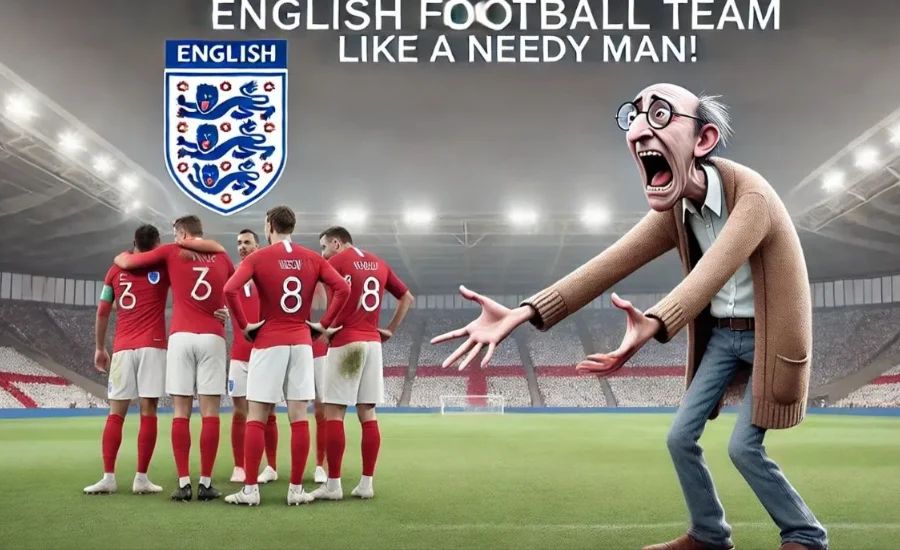English Football Team Like A Needy Man Meme, Appealing, Storied & More
Introduction to English Football Team Like A Needy Man Meme
As a desperate individual looking for love or attention, the “needy man” meme hilariously conveys the sense of vulnerability and desire. Throughout the season, English football supporters’ intense feelings are reflected in this meme. Teams have highs and lows as they work to win over their supporters, and like the “needy man,” they long for success and recognition. From last-minute goals to exciting comebacks to heartbreaking losses, the meme captures the emotional spectrum of fans. The intense emotional attachment that supporters have to their teams is comically reflected in it, capturing the aspirations and disappointments associated with the beautiful game.
Why Fans Find the Meme Appealing

Because of their strong emotional attachment to their teams, football fans, particularly those in England, find resonance in the “needy man” cliché. With its highs of triumph and lows of unanticipated losses, this partnership is like riding a rollercoaster, bringing with it both heartbreak and optimism. The supporters’ reliance on their teams is comically shown in the meme as they demonstrate allegiance to their teams regardless of the result and remain involved in every game. It expresses the ongoing demand for approval, reflecting the devotion and emotional commitment of supporters. In the end, the meme captures the distinct, highly charged emotional experience of football fanaticism, which makes it compelling and accessible.
The “Needy Man” meme’s development and effects
Like current hieroglyphs, memes are succinct renderings of complex concepts that have developed into a modern communication form. The “needy man meme” is a prime example of this trend, showing a character who is always looking for approval in social and professional contexts. Its comedy strikes a chord with many people because it captures a common weakness that many people encounter but few talk about. The meme, which originated in online forums and social media, changes depending on the situation while maintaining its essential idea of neediness. This adaptability enables it to highlight problems and criticize underappreciated behaviors in a variety of contexts, including sports fanaticism, offering a humorous yet perceptive look at the complexity of human nature.
A Storied Past: The Triumphs and Trials of English Football
The history of English football is a rich tapestry woven with moments of exhilarating triumph and profound disappointment. From the pinnacle of the 1966 World Cup victory to the heart-wrenching defeats often decided by dreaded penalty shootouts, this journey mirrors the emotional highs and lows experienced by its passionate supporters. Each tournament begins with a flicker of hope, only to culminate in the haunting question, “What if?”—a narrative reminiscent of a Shakespearean drama.
The landmark achievement in 1966, led by legends like Bobby Moore and Geoff Hurst, set a gold standard for English football, creating a legacy that continues to inspire future generations. This victory transcended mere sporting success; it became a defining moment of national pride and a cornerstone of the country’s football heritage. The players from that era are often used as benchmarks against which all subsequent teams are measured.
Why the Meme Resonates with Fans
The “needy man” meme strikes a chord with football fans, particularly those supporting English teams, because it encapsulates the intense emotional connection they share with their clubs. This relationship is often characterized by dramatic highs and lows, resembling a rollercoaster ride. Fans experience the thrill of glorious victories juxtaposed with the anguish of gut-wrenching losses, creating a sense of constant emotional investment.
This cyclical journey of hope and disappointment is humorously captured by the “needy man” analogy, which illustrates how fans often feel an overwhelming need to support their team, regardless of the outcomes on the pitch. Despite facing heartbreak, fans remain loyal and committed, as if their affection for the team is a fundamental part of their identity. The meme cleverly reflects this dynamic, emphasizing the unyielding dependence fans have on their teams and the universal experience of navigating the unpredictable nature of football fandom.
Comparing Meme Perception with Team Performance
The Deeper Truth Behind the Meme
While the “needy man” meme humorously addresses the emotional rollercoaster of supporting the England football team, it also highlights a more profound reality regarding the team’s historical performances. Despite being regarded as a footballing powerhouse, England’s results have often fallen short of the lofty expectations set by both fans and analysts. This ongoing cycle of anticipation, disappointment, and renewed hope closely mirrors the sentiments expressed in the meme, making it highly relatable for supporters.
Real-Life Fan Experiences
English football fans readily connect with the meme through their own experiences. Many have passionately followed the team through triumphs and setbacks, sharing moments of pride during significant tournaments like the World Cup and the UEFA European Championship. However, these high points are frequently accompanied by heartbreak from near misses and unexpected exits.
This emotional investment is what strengthens the bond between fans and their team, even in challenging times. The “needy man” meme encapsulates this relationship perfectly, using humor to help fans navigate the inevitable ups and downs of their football journey. It serves as a reminder that, despite the frustrations, the passion and loyalty of fans remain unwavering.
The Role of Memes in Football Culture

In today’s football landscape, memes have emerged as the modern-day anthems of the sport, offering both instant commentary and much-needed humor amidst the intensity of the game. These memes often reflect the enduring underdog status of the English national team, capturing the familiar narrative of “so near yet so far” that has marked many of their competitive outings.
These playful images and clever captions provide fans with a unique outlet to express their emotions, whether it’s excitement, frustration, or confusion regarding the team’s performances. Beyond mere entertainment, memes shape public perception of the team’s decisions, strategies, and historical legacy. They encapsulate moments of both spectacular failure and near success, allowing supporters to collectively process and articulate their feelings.
The Influence of Memes on Sports Culture
Memes have become deeply embedded in sports culture, significantly transforming how fans engage with their favorite teams and athletes. These digital expressions serve as emotional outlets, capturing everything from the joy of victory to the despair of defeat. Consequently, memes have evolved into a powerful narrative device in sports, offering fresh perspectives and enriching the interactive experience for fans.
Take the “needy man” meme, for example; it transcends simple humor about the English football team’s performance. Instead, it encapsulates the emotional rollercoaster that supporters endure. Through humor, these memes foster a sense of community among fans, allowing them to share in the loyalty, frustration, and hope that define their experience. This comedic lens softens the sting of losses while amplifying the joy of victories, creating a shared bond among supporters.
Endless Expectations: The Relevance of the “Needy Man” Meme
The “needy man” meme effectively captures the English football team’s ongoing quest for international recognition. It portrays an individual perpetually seeking validation, a sentiment that resonates with the emotional tug-of-war fans experience. Despite England’s rich football heritage, the frequent near-victories followed by abrupt disappointments echo the emotional highs and lows depicted in the meme.
With each tournament, the psychological weight of past failures and unmet expectations can take a toll on players. They not only grapple with the pressure to live up to the nation’s storied football legacy but also bear the emotional scars from prior near-misses. In this quest for elusive international success, the focus often shifts from merely winning to affirming their status as one of football’s elite teams.
Engaging Fans in the Digital Age
In today’s digital landscape, engaging fans requires more than traditional press conferences and matchday programs; it necessitates active participation in online discussions and interactions. The use of memes, such as the “needy man,” presents English football clubs with a unique opportunity to connect with their supporters in a fun and relatable way.
By embracing and engaging with meme culture, teams can cultivate a sense of community and solidarity among fans. When a club shares or responds to memes, it appears more approachable and relatable, thereby strengthening its bond with its fan base. This interaction helps to humanize the team, creating a closer and more intimate connection with supporters.
The Weight of Expectations: Pressure on the English Team
Every international tournament reignites the nation’s hopes that the “years of hurt” will finally come to an end, placing enormous pressure on the English football team to deliver strong performances. This pressure encompasses various aspects, from tactical decisions to individual player performance and coaching strategies, creating both motivation and strain.
Faced with the expectations to win, coaches and players often adopt conservative approaches during games, prioritizing risk management over aggressive tactics. This risk-averse mindset may result in more cautious strategies, where the desire to make bold, game-changing moves is overshadowed by the fear of repeating past failures. Coaches, aware of the scrutiny they face, might opt for safer lineups or substitutions to mitigate potential criticism from the media and fans.
On the field, players may grapple with heightened anxiety as they feel the weight of the nation’s aspirations. This pressure can affect their confidence and decision-making abilities during crucial moments. Every missed opportunity or defensive error becomes part of a larger narrative of unrealized potential, amplifying the stakes for each match.
Ultimately, these high expectations shape how coaches and players approach each game, knowing that their every action will be scrutinized by both the media and the fanbase. While the desire to break the cycle of disappointment serves as a powerful motivator, the relentless pressure can stifle creativity and diminish the joy of the game. Thus, each competition becomes not only a battle against opponents but also a struggle against the ghosts of past mistakes.
Turning the Tide: A New Era for English Football?
In recent years, the narrative surrounding English soccer is experiencing a transformative shift. Landmark achievements, like accomplishing the semi-finals within the 2018 FIFA World Cup and the finals of Euro 2020, signal a massive turnaround for the countrywide group. Several elements make a contribution to this optimism, with one of the most vital being the influx of fresh expertise. Young, dynamic gamers are stepping onto the worldwide stage, bringing skill and a brand new mind-set to high-pressure fits. This new technology is supported by revolutionary education techniques that emphasize teamwork, tactical flexibility, and mental resilience.
Additionally, the mixing of superior technology in training and gameplay is vital. Enhanced statistics analytics and overall performance tracking permit coaches and gamers to research strengths and weaknesses correctly, main to informed decision-making. As England prepares for upcoming tournaments, there’s a palpable feel of wish that they might subsequently break unfastened from a long time of close to-misses, suggesting the dawn of a new bankruptcy in English soccer.
The England football team opened a bakery, but why?

“Because they really know how to make turnovers when it matters most!” is the straightforward punchline. The England football team’s propensity to lose possession or make crucial errors at crucial times, particularly in important competitions, is sarcastically criticized in this joke. It honors the innumerable occasions when supporters have watched their team come close to greatness only to fall because of mistakes. Beneath the hilarity comes a deeper story about English football: pressure may cause unanticipated breakdowns even when players are talented and have promise. Supporters use this lighthearted banter as a coping strategy, creating a sense of camaraderie as they work through their emotional ups and downs.
Facts
- Cultural Phenomenon: Memes have transformed how fans engage with sports, acting as both humor and commentary on real-time events and performances.
- Historical Context: The English national football team has experienced significant highs, including their 1966 World Cup victory, but has also faced numerous disappointments, contributing to the longing reflected in the meme.
- Fan Loyalty: Research indicates that football fans often exhibit deep emotional ties to their teams, with many dedicating significant portions of their time and energy to following their clubs.
- Digital Age Impact: The rise of social media has allowed memes to spread rapidly, making them a popular form of communication among fans, enabling them to share their emotions and experiences instantaneously.
- Evolution of Memes: Memes like the “needy man” have evolved over time, adapting to various contexts and themes while retaining their core message of vulnerability and longing.
Conclusion
The emotional rollercoaster that English football fans go through when cheering for their favorite teams is captured in the “needy man” meme. This touching and funny depiction serves as a reminder of the strong bonds that supporters develop with their teams, sharing in both the happiness of winning and the sorrows of losing. The meme resonates like a mirror reflecting the hopes and disappointments that follow every match as English football navigates its journey through victories and setbacks.
As the English national team strives to reclaim its former glory, the sense of yearning expressed in the meme underscores the ongoing struggle for recognition and success. It beautifully illustrates the relationship between fans and their teams—a bond built on unwavering loyalty, shared experiences, and the relentless hope that tomorrow might bring a brighter outcome. In this ever-evolving narrative, the “needy man” meme remains a significant cultural touchstone, providing both a lighthearted escape and a relatable commentary on the complexities of football fandom.
FAQs
1. What is the “needy man” meme about?
The “needy man” meme features a character who appears desperate for attention and validation, symbolizing the emotional needs and vulnerabilities many people experience. In the context of English football, it humorously reflects the intense desire fans have for their teams to achieve success.
2. What makes this meme relatable to football fans?
Football fans, especially those supporting English teams, relate to the meme because it captures the emotional highs and lows of being a supporter. The feelings of hope, disappointment, and loyalty experienced during matches resonate deeply with the struggles depicted in the meme.
3. How has the “needy man” meme influenced football culture?
The meme has become a significant part of football culture, offering a humorous lens through which fans can express their emotions about their teams. It has facilitated online discussions and created a sense of community among supporters, allowing them to share both their frustrations and triumphs.
4. What impact does humor have on football fandom?
Humor, such as that found in memes, helps fans cope with the emotional challenges of supporting their teams. It creates an environment where supporters can laugh together, reinforcing their bond and making the experience of following their team more enjoyable.
5. What does the future hold for the English football team?
With emerging talents and innovative coaching strategies, there is a growing sense of optimism surrounding the English football team. Fans hope that these developments will lead to success in upcoming tournaments, potentially rewriting the narrative of near misses and heartbreaks.
For more Information About Entertainment visit risingperson




